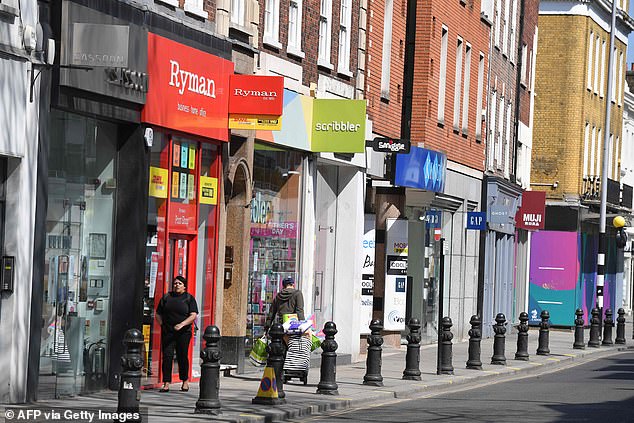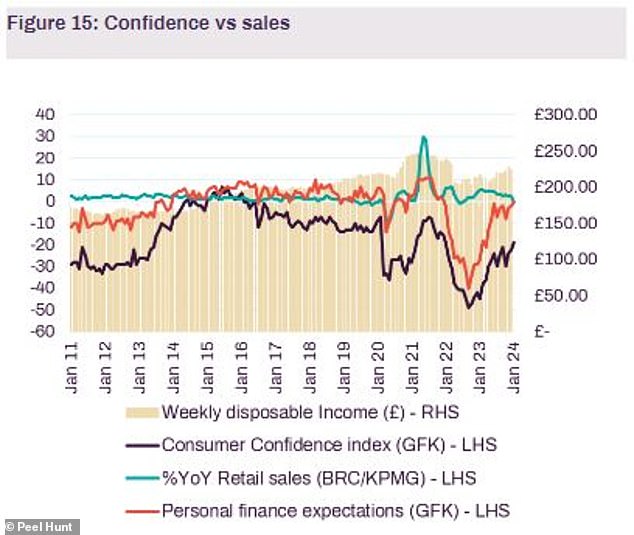A burgeoning bidding war over the ownership of Currys could be a sign of things to come in 2024, as weak valuations mark Britain’s retailers as ripe targets for takeovers on the cheap.
Currys shares have soared over the last week after the group rejected two consecutive takeover offers from US hedge fund group Elliot Advisors, while Chinese retail behemoth JD.com is ‘in the very preliminary stages’ of weighing up a bid.
The electricals retailer will be hoping to avoid the fate of other British retails that have fallen into private hands in recent years, such as rival Comet, Debenhams, Phones4U and, more recently, The Body Shop.
And impending interest rate cuts and easing cost of living pressures are also beginning to lift British consumer confidence, meaning acquirers could pick up bargains just as the retail sector regains its full strength.

The high street for sale: UK retailers look vulnerable to takeover as they trade at weak valuations
Ian Lance, co-head of the UK value and income team at Redwheel, which holds a combined 14.6 per cent stake in Currys, said the retailer is worth ‘substantially more’ than the 62p Elliot offer.
He added: ‘[The bid highlights] a wider problem with the UK equity market which no longer seems to fulfil its primary purpose of price discovery and efficient capital allocation.’
Lance said ‘depressed valuations’, driven by large domestic investors shifting their portfolios away from the country, means overseas corporate buyers will continue to ‘take advantage’ and ‘the number of quoted UK businesses will continue to decline’.
Analysis from brokerage Peel Hunt suggests consumer-focused retailers are particularly vulnerable in this regard.
The nine stocks within Peel Hunt’s ‘consumer relevant market leaders and core’ category have an average price-to-earnings ratio – a key metric in understanding a company’s value – of just 11.8, skewed heavily to the upside by Greggs with a P/E ratio of 20. Five stocks in the basket are trading at single digit P/E ratios.
The S&P Retail Select Industry Index, a basket of retail focused US-listed stocks, had a P/E ratio of around 16.4 at the end of January.
At a share price level, Greggs is the only stock in Peel Hunt’s selection of nine companies trading higher than the broker’s target price.
The stocks are trading on average 38 per cent lower than Peel Hunt’s target share price, with DFS Furniture the most undervalued in the broker’s eyes at 68 per cent.
Nigel Yates, portfolio manager at AXA Investment Managers, noted that valuation concerns have dogged London markets for some time, driving M&A activity on a ‘sector agnostic’ basis typically at the smaller end of the market where the most ‘extreme’ discounts are seen.
However, he said the retail sector now ‘looks vulnerable given the value on offer alongside improving prospects for the consumer’.
And retailers are preparing for better times ahead in this regard, with inflation falling, interest rates set to fall and cost of living challenges easing.
Yates said: ‘Whisper it quietly but easing inflationary pressures, stable employment levels and rising incomes, alongside tax cuts and lower household gas prices have the potential to put the UK consumer firmly back in the driving seat.
‘Will the stock market or private equity recognise the changing landscape first?’

Better times ahead? UK consumer confidence is improving
Peel Hunt, which believes Currys is unlikely to engage on any offers ‘less than 80p’ a share, added: ‘Cheap valuations across the sector, especially for market leaders, many of which trade on single-digit PEs, mean we are likely to see much more M&A activity this year.
‘With interest rates having peaked, the outlook for M&A from both PE and trade buyers seems likely to pick up given the low level of sector valuations.’
Brendan Gulston, co-manager of the WS Gresham House UK Multi Cap Income Fund, noted takeover speculation surrounding motor and cycling retailer Halfords, which ‘has been transitioning towards a services-based business model following their acquisition of The National’.
Gulston added: ‘With a strong market position, improving quality of earnings and significant management levers to offset potential headwinds, we believe Halfords’ earnings growth is largely within the control of the management team.
‘This is an attractive long term growth story and the shares are undemanding, trading at a low to mid-single digit earnings multiple.’
Some links in this article may be affiliate links. If you click on them we may earn a small commission. That helps us fund This Is Money, and keep it free to use. We do not write articles to promote products. We do not allow any commercial relationship to affect our editorial independence.



